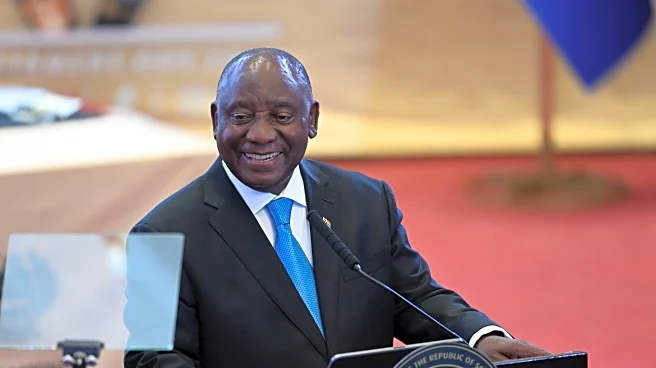What's Happening?
China's Communist Party has released a new 5-year plan focusing on reducing reliance on foreign technology and increasing domestic consumer demand. This plan comes amid ongoing trade tensions with the
United States. The plan, outlined in a 5,000-word communique, emphasizes the need for scientific and technological self-reliance and aims to strengthen China's international influence by 2035. Despite trade tensions, China intends to maintain its status as a global manufacturing power while fostering economic growth at home. The plan also addresses domestic economic challenges, such as a downturn in the property sector and sluggish consumer confidence, by encouraging investment in modernizing factories and offering subsidies for new appliances and vehicles.
Why It's Important?
The new 5-year plan is significant as it reflects China's strategic shift towards self-reliance in technology and increased domestic consumption, which could alter global trade dynamics. By focusing on advanced manufacturing and reducing dependency on foreign technology, China aims to bolster its economic resilience against external pressures, particularly from the ongoing trade war with the U.S. This move could impact U.S. industries reliant on Chinese manufacturing and technology, potentially leading to increased competition and trade barriers. Additionally, China's emphasis on domestic demand could influence global supply chains and affect international markets.
What's Next?
China's commitment to enhancing technological self-reliance and boosting domestic demand may lead to further policy developments aimed at supporting these goals. The plan's implementation could result in increased government investment in high-tech industries and consumer incentives, potentially reshaping China's economic landscape. As China seeks to expand its international influence, other countries, including the U.S., may respond with strategic adjustments in trade policies and diplomatic relations. The ongoing trade tensions could escalate if China successfully reduces its reliance on foreign technology, prompting further negotiations or conflicts.
Beyond the Headlines
The plan's focus on technological self-reliance raises ethical and geopolitical questions about the balance of power in global technology markets. China's efforts to safeguard the multilateral trading system while pursuing self-reliance may challenge existing trade agreements and international norms. The emphasis on domestic demand also highlights cultural shifts within China, as the government encourages consumerism to drive economic growth. These developments could lead to long-term changes in China's societal values and economic priorities.










